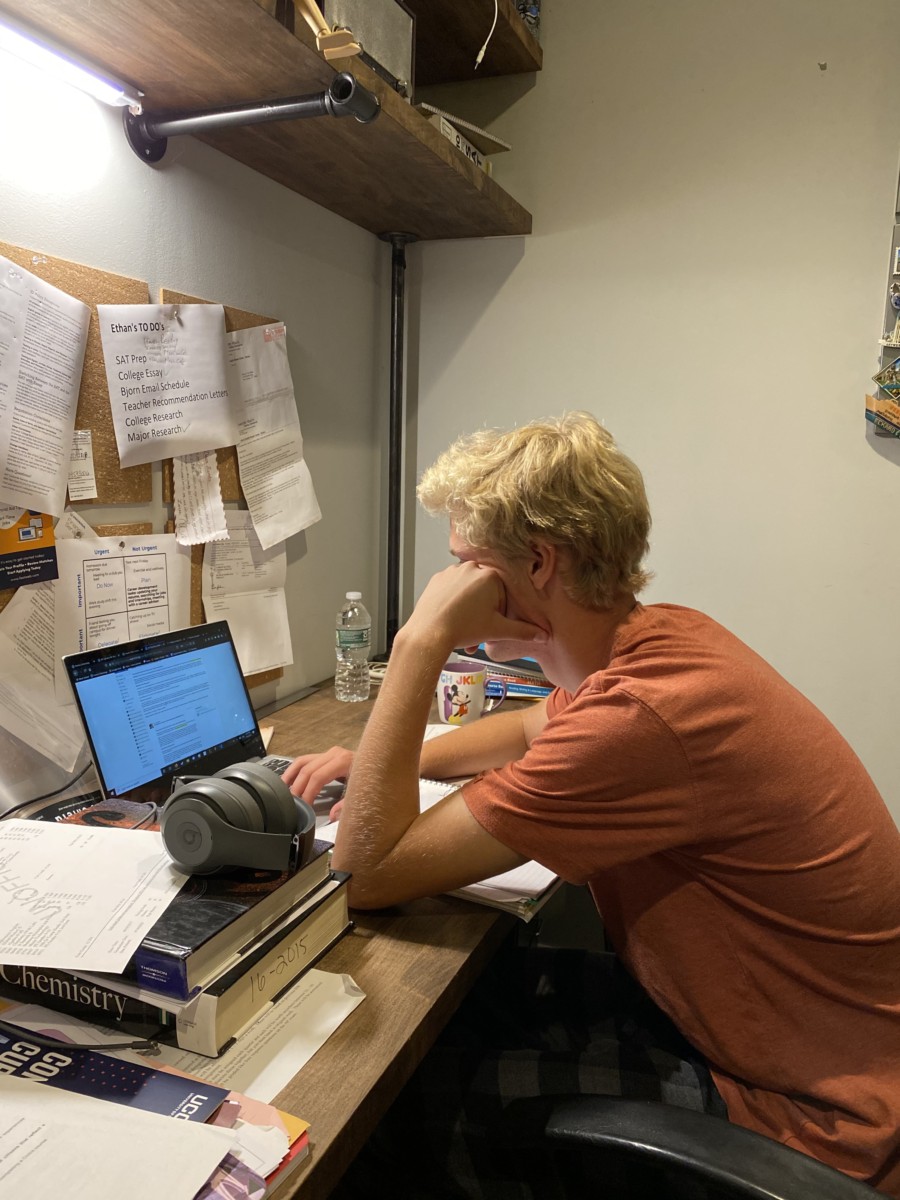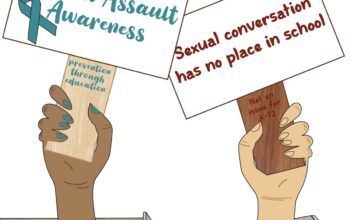Sara Conroy, Senior Editor
@sconroycourant
Even though Sara Lockyer is going to school from her bedroom, surrounded by fluffy pillows and lit by the soft purple glow of LED lights, she isn’t in her happy place. For her, Zoom meeting after Zoom meeting is the worst-case scenario for school. But senior Dylan Lee is having a different experience.
Schooling from home cuts out distractive classmates, nosy classrooms and the ability to look out the window and daydream, which allows her to focus and better manage her time.

Whether kids are hybrid or remote, the new hybrid system and Zoom learning have elicited different reactions and a range of challenges. Personally I connect with Dylan’s experience because it allows me to concentrate and efficiently get my work done; however, not all of my classmates feel the same way about this new form of schooling.
Sara Lockyer, a senior who has gone entirely virtual, is not enjoying it as she is missing her friends now more than ever before and is tired of being locked in her house. “I feel extremely isolated with the new online learning. One of the best parts of my day was seeing my friends.” Sara said. “I also loved working on group projects and collaborating with my classmates. With a lack of these social interactions, I have been struggling.”
Sara is very artistic, so she attempts to combat this boredom and isolation by strumming out a few chords on her guitar and producing her own short songs with the app garage band. She can collaborate with friends over facetime, and even though it is not quite like seeing them in person, Sara says it is helping her “stay sane” in this global pandemic.
In an article published by New@Northeastern.edu, Laura Dudley, a behavior analyst at Northeastern University, explains why students like Sara may be feeling this way and highlights why human interaction is so important. “Being on so many video conferences is exhausting. That’s because many of the nonverbal cues that we typically rely upon during in-person conversations—eye contact, subtle shifts that indicate someone is about to speak—are out the window,” she said. “We used to take breaks from people by spending time on our gadgets. Now, we take breaks from our gadgets by seeking out real, live human connection.”
Sara is not the only student facing this problem. Senior Ethan Vanstaden, who has chosen to participate in the hybrid system, is not enjoying his monotonous daily routine of getting up, going to his computer, getting food, and then going right back to his laptop. “I like more variety. Getting dressed and ready to go in person helps me to wake up and prepare for the day,” Ethan said. “I find being on my computer 24/7 to be excessively straining.”
Ethan is not a fan of Zoom calls because it’s difficult for him to learn the material. “I need in-person lectures to help me stay focused and to understand the classwork,” Ethan said. “I find it more difficult to ask questions, communicate, and to get help from your teachers when in a Zoom class. I find it’s easy to get distracted and sit on your phone during class.”
In an article published by Psychreg.org titled “The Psychology Behind ‘Zoom Fatigue’ Explained,” Dr. Linda Kaye explains that Zoom may have some negative physical repercussions, including Zoom fatigue, which is what Ethan is feeling at the moment. “Fatigue is caused by technical restrictions and our inability to be able to fully use the usual array of social cues and non-verbal communication,” Dr. Kaye said. “Within video calls, the bandwidth of social cues is much narrower, and we have to pay additional attention to others’ behavior to enable us to monitor social interactions effectively. These extra attentional efforts can become tiring over time.”
One way for Ethan to combat this Zoom fatigue is to go running with friends. It helps him clear his mind, get away from his computer and get a breath of fresh air, which leaves him feeling happy and healthy.
While Zoom seems to have some adverse effects, not everyone is against this new learning and communication system. Senior Dylan Lee, who has chosen to go fully remote, explains that she favors Zoom and online learning. “I prefer online schooling because I can plan my time out better,” Dylan said. “Since I have to balance both schools and swim team practices, I find this new form of learning quite beneficial.”
Dylan also enjoys at home learning because it adheres to her personal learning style. “As someone with severe ADHD, online schooling makes it easier for me to concentrate,” She said. “I can focus more in my home environment as less is going on around me.”
She also can help out her freshman sister, Skylar, with her online learning. Because Dylan and Skylar are so close, Dylan doesn’t feel isolated because her sister keeps her company. She feels like she always has her best friend with her.

I feel similar to Dylan. I recently went fully remote, and I love it because I’ve been able to work more efficiently with no distractions from my friends and classmates. I also get to sleep in a little more with the classroom being in my bedroom. However, while I enjoy online learning, I miss getting all dressed up for school and communicating with all my close friends and even those you see throughout the day, which you may not think about.
While Zoom helps me get stuff done, I do at times, feel lonely and wonder if this productivity is at the expense of my happiness and mental health. According to an article published by reachinghighernh.org “Online learning has taken a mental toll on some students who do well in the traditional school setting. Many educators report an increase in anxiety among students due to the overload of work and the difficulty of concentrating in class.”
If you are a remote learner and are struggling or feeling isolated, talking with teachers or your counselor, or dropping in on the new Teen Talk counselor, Grace Burke, whose office is across from the nurse, can be extremely helpful.




